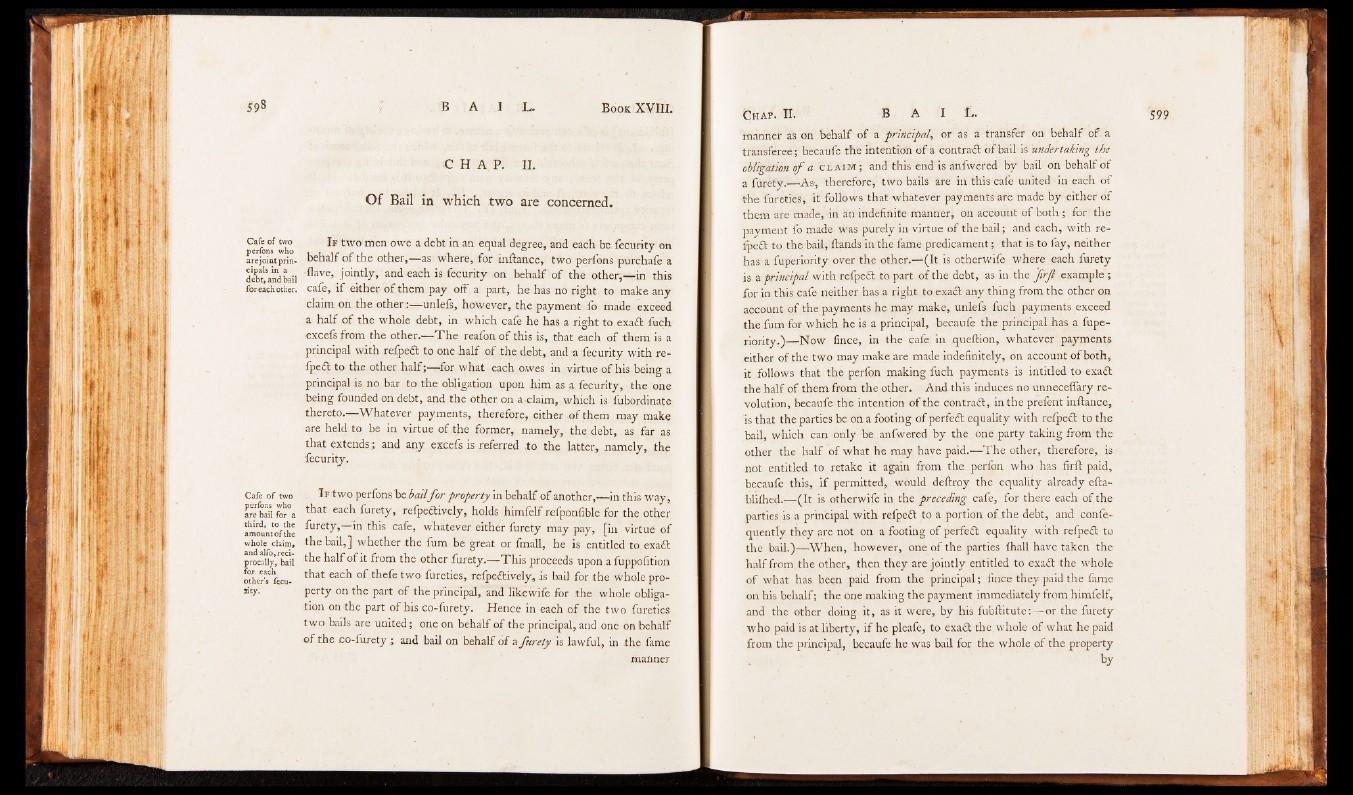
Cafe of two
perfons who ■
arejoint principals
in a
debt» and bail
for each other.
Cafe o f two
perfons who
are bail for a
third, to the
amount of the
whole claim,
and alfo, reciprocally,
bail
for each
other’s fecu-
a ty.
C H A P. II.
O f Bail in w h ich tw o are concerned.
If two men owe a debt in an equal degree, and each be fecurity on
behalf of the other,— as where, for inftance, two perfons purchafe a
-Have, jointly, and each is fecurity on behalf of the other;— in this
cafe, if either-of them pay off a part, he has no right to make any
claim on the other:— unlefs, howeyer, the payment fo made exceed
a half of the whole debt, in which cafe he has a right to exadt fuch
excefs from the other.— T h e reafon of this is, that each of them is a
principal with refpedt to one half of the debt, and a fecurity with re-
fpedt to the other half;— for what each ,o,wes in virtue of his being a
principal is no bar to the obligation upon him as a fecurity, the one
being founded on debt, and the other on a-claim, which is fubordinate
thereto.— Whatever payments, therefore, either -of them may make
are held to be in virtue of the former, namely, the debt, as far as
that extends.; and any excels is referred to the latter, namely, the
fecurity:.
Tf two perfons be ba ilfo r property in behalf of another,— in this way,
that each furety, refpedtively, holds himfelf refponfible for the other
furety, in this cafe, whatever either furety may pay, [in virtue of
the bail,] whether the fum be great or fmall, he is entitled to exaft
the half of it from the other furety.— This proceeds upon a fuppofition
that each of thefe two fureties, refpedtively, is bail for the whole property
on the part of the principal, and likewife for the whole obligation
on the part of his co-furety. Hence in each of the two fureties
two bails are united; one on behalf of the principal, and one on behalf
of the co-furcty ; and bail on behalf of a furety is lawful, in the fame
manner
manner as on behalf of a principal, or as a transfer on behalf o f a
transferee; becaufe thé intention of a contradt of bail is undertaking the
obligation o f a c l a im ; and this end is anfwered by bail on behalf of
a furety.— As, therefore, two bails are in this Cafe united in each of
the fureties, it follows that whatever payments are made by either of
them are made, in an indefinite manner, on account of both ; for the
payment fo made was purely in virtue of the bail; and each, with re-
fpedt to the bail, Hands in the fame predicament; that is to fay, neither
has a fuperiority over thé other.— (It is otherwife where each furety
is a principal with refpedt to part of the debt; as in the fir jl example ;
for in this cafe neither has a right to exact any thing from the other on
account of the payments he may make, unlefs fuch payments exceed
the fum for which he is a principal, becaufe the principal has a fupe-
riprity.)— Now fince, in t-he cafe in queftion, whatever payments
either of the two may make are made indefinitely, on account of both,
it follows that the perfon making fuch payments is intitled to exadt
the half of them from the other. And this inducés no unnecelfary revolution,
becaufe the intention of the contradt, in the prefent inftance,
is that the parties be on a footing of perfedt equality with refpedt to the
bail, which can only be anfwered by the one party taking from the
other the half of what he may have paid.— The other, therefore,. is
not entitled to retake it again from the perfon who has firft paid,
becaufe this, if permitted, would deftroy the equality already efta-
blifhed.— (It is otherwife in the preceding cafe, for there each of the
parties is a principal with refpedt to a portion o f the debt, and confe-
quently they are not on a footing of perfedt equality with refpedt to
the bail.)— When, however, one of the parties fhall have taken the
half from the other, then they are jointly entitled to exadt the whole
of what- has been paid from the principal; fince they paid the fame
on his behalf; the one making the payment immediately from himfelf,
and the other doing it, as it were, by his fubftitute: — or the furety
who paid is at liberty, if he pleafe, to exadt the whole of what he paid
from the principal, becaufe he was bail for the whole of the property